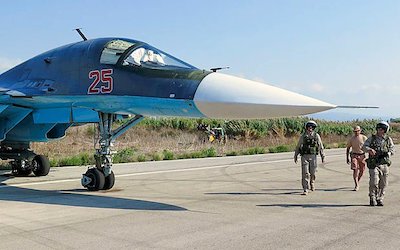BACKGROUND:
The Syrian conflict, which started in 2011 as a civil uprising against President Bashar al-Assad’s regime, has evolved into a complex civil war involving numerous factions, including the Syrian government, various opposition groups, terrorist organizations like ISIS, and foreign powers. Over half of Syria’s population has been displaced internally or as refugees due to the conflict, with significant infrastructure damage and economic decline. The war has seen involvement from international actors like Russia, backing the government, and the US, Turkey, and various Gulf states supporting opposition groups at different times. Despite a decline in active combat, the situation remains volatile, particularly in the northwest where opposition forces, including Hay’et Tahrir al-Sham, hold territory. The conflict has led to over 500,000 deaths and widespread humanitarian crises, with areas like Idlib still experiencing periodic violence.
Rebel forces have now launched a major offensive, taking control of parts of Aleppo, which is a significant tactical move as it’s one of Syria’s largest cities. This offensive marks the first time opposition forces have seized territory in Aleppo since 2016, indicating a possible escalation in the conflict. Additionally, there have been intense clashes in Damascus, suggesting internal strife or power struggles among government factions
Russian equipment will enter Syria within 72 hours – Russians launching airstrikes on Aleppo https://t.co/x5ztlbXjvi pic.twitter.com/kURiGFpNcw
— Kallyz NetWork (@KallyzNetWork) December 2, 2024
#BREAKING: Bad news for #Erdogan. The #Syrian Democratic Forces (#SDF) have taken control of #Aleppo International airport in Northern #Syria. This prevents the Al-Qaeda affiliated terrorists of #Turkey from receiving supplies from the #Turkish Air Force by means of this airport. pic.twitter.com/w6aIZpUNux
— Babak Taghvaee – The Crisis Watch (@BabakTaghvaee1) November 30, 2024
Leaders flee to Moscow
Recent posts on X indicate that President Bashar al-Assad and his family are in Moscow, Russia. Specifically, reports mention that Assad’s family has settled into the Four Seasons Hotel on Okhotny Ryad, and Assad himself was at a reception in the Kremlin. This information suggests that the ruling family has temporarily relocated to Moscow amid the escalating situation in Syria.
Are Putin's dominos toppling!
— OSINT (Uri Kikaski)
Breaking: There is a lot of chatter that Bashar al-Assad and his family have relocated to #Moscow and that NCSROF forces now control all of Aleppo. It appears Russian and Syrian defenses, as well as the government of Syria, may have collapsed.… pic.twitter.com/GqkoebMvgV



(@UKikaski) November 30, 2024
Turkish-backed Islamist militias, now in control of Aleppo International Airport, have released footage showing them destroying alcohol bottles from the airport's duty-free shops while chanting "Allahu Akbar." Consumption of alcohol is forbidden in Islam. pic.twitter.com/iixhT7hfLA
— Melissa Chapman-Mushnick מרים (@MelissaSChapman) December 2, 2024
1/ Developments in Syria going so fast that reports become obsolete moments later.
— Jenan Moussa (@jenanmoussa) December 1, 2024
I've reported from inside Syria since 2011 and I live in the MidEast. So, let me explain in this thread what the implications could be for Syria and wider region in case the Syrian regime falls:
Background
The relationship between Syria and Russia is multifaceted and has deep historical roots:
- Historical Ties: The relationship dates back to the Cold War era when Syria was an ally of the Soviet Union. Diplomatic relations were established in 1944, and the Soviet Union provided significant military and economic assistance to Syria, particularly from the 1950s onward. This included support against Western influence in the region and military aid during conflicts like the 1973 Yom Kippur War.
- Military Presence: Russia maintains a significant military presence in Syria, most notably with its naval base in Tartus, which is Russia’s only Mediterranean naval base. This base was expanded after Russia’s military intervention in 2015, which played a pivotal role in turning the tide of the Syrian Civil War in favor of President Bashar al-Assad’s government.
- Political Support: Russia has been a staunch supporter of the Assad regime during the Syrian Civil War. The Russian military intervention in 2015, authorized by the Russian parliament, aimed at combating terrorism but also at bolstering Assad’s control over Syria. Russia’s involvement has included air strikes, logistical support, and diplomatic backing at the United Nations.
- Economic Relations: Trade between Russia and Syria includes Syrian exports like agricultural products, textiles, and minerals. Russia has also been involved in economic projects in Syria, including oil exploration, though these have been limited by the ongoing conflict.
- Strategic Partnership: The relationship is strategic for both countries. For Russia, Syria provides a foothold in the Middle East, enhancing its global power projection and countering Western influence in the region. For Syria, Russian support is crucial for maintaining regime stability against various opposition groups and international pressures.
- Recent Developments: High-level meetings between Russian and Syrian leaders continue to underscore their close relationship. For instance, recent posts on X mention President Assad meeting with President Putin in Moscow, discussing trade, economic ties, and the situation in Syria, reflecting ongoing engagement at the highest levels.
- Cultural and Educational Exchanges: There’s also a cultural dimension, with many Syrians having been educated in Soviet and Russian institutions, fostering long-term connections between the two nations.
This relationship has been instrumental in shaping the course of the Syrian conflict, allowing Assad to retain power with significant military and political backing from Russia. However, it also places Russia in a complex position, balancing its interests with those of other regional and international players like Turkey, Iran, and Israel.
